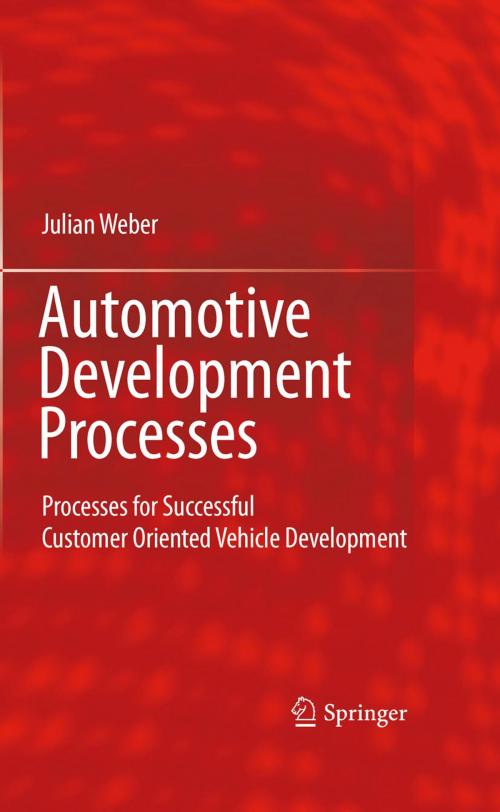Automotive Development Processes
Processes for Successful Customer Oriented Vehicle Development
Nonfiction, Science & Nature, Technology, Industrial Design, Engineering, Automotive| Author: | Julian Weber | ISBN: | 9783642012532 |
| Publisher: | Springer Berlin Heidelberg | Publication: | June 22, 2009 |
| Imprint: | Springer | Language: | English |
| Author: | Julian Weber |
| ISBN: | 9783642012532 |
| Publisher: | Springer Berlin Heidelberg |
| Publication: | June 22, 2009 |
| Imprint: | Springer |
| Language: | English |
The global crisis the automotive industry has slipped into over the second half of 2008 has set a fierce spotlight not only on which cars are the right ones to bring to the market but also on how these cars are developed. Be it OEMs developing new models, suppliers integerating themselves deeper into the development processes of different OEMs, analysts estimating economical risks and opportunities of automotive investments, or even governments creating and evaluating scenarios for financial aid for suffering automotive companies: At the end of the day, it is absolutely indispensable to comprehensively understand the processes of auto- tive development – the core subject of this book. Let’s face it: More than a century after Carl Benz, Wilhelm Maybach and Gottlieb Daimler developed and produced their first motor vehicles, the overall concept of passenger cars has not changed much. Even though components have been considerably optimized since then, motor cars in the 21st century are still driven by combustion engines that transmit their propulsive power to the road s- face via gearboxes, transmission shafts and wheels, which together with spri- damper units allow driving stability and ride comfort. Vehicles are still navigated by means of a steering wheel that turns the front wheels, and the required control elements are still located on a dashboard in front of the driver who operates the car sitting in a seat.
The global crisis the automotive industry has slipped into over the second half of 2008 has set a fierce spotlight not only on which cars are the right ones to bring to the market but also on how these cars are developed. Be it OEMs developing new models, suppliers integerating themselves deeper into the development processes of different OEMs, analysts estimating economical risks and opportunities of automotive investments, or even governments creating and evaluating scenarios for financial aid for suffering automotive companies: At the end of the day, it is absolutely indispensable to comprehensively understand the processes of auto- tive development – the core subject of this book. Let’s face it: More than a century after Carl Benz, Wilhelm Maybach and Gottlieb Daimler developed and produced their first motor vehicles, the overall concept of passenger cars has not changed much. Even though components have been considerably optimized since then, motor cars in the 21st century are still driven by combustion engines that transmit their propulsive power to the road s- face via gearboxes, transmission shafts and wheels, which together with spri- damper units allow driving stability and ride comfort. Vehicles are still navigated by means of a steering wheel that turns the front wheels, and the required control elements are still located on a dashboard in front of the driver who operates the car sitting in a seat.















